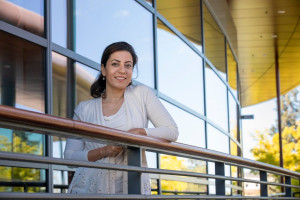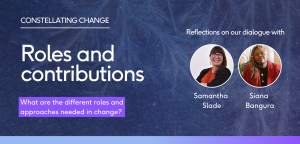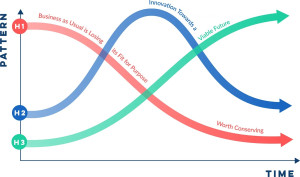Kate Goodwin is an Australian designer and researcher experimenting with ways to help people think, feel and act in areas of social, economic and environmental complexity. Currently experimenting with the title ‘system-led designer’, she has over 16 years experience in user experience, service and strategic design in social impact, criminal justice, financial services, higher education and government. In March 2020 she moved to Berlin, Germany to pursue work in climate action and sustainability. Kate attended the School of System Change Basecamp in 2019. Here she shares with us some reflections on her journey with systems practice and how it has helped her do impactful work. More about her work: www.matchboxstudio.com.au
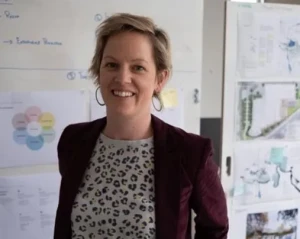

What are you working on at the moment? What are your proudest achievements in the field?
Right now I’m working part-time as a Design and Research Specialist with Democratic Society (Demsoc), a non-government, Europe-wide organisation committed to connecting people with power through democratic practice. I’m fortunate to be part of the Climate Programme team working on EIT Climate-KIC Healthy, Clean Cities Deep Demonstrations in 10+ European cities. I’m proud to be involved in developing Demsoc’s Democratic Climate Model for climate resilience, which invites cities to take a more holistic view on what’s needed for climate action, looking beyond technocratic solutions and cultivating conditions of ‘social soil’ for more just, longer-term change.
In my volunteer time I’m a ‘friend’ of Donut Berlin, part of the global Doughnut Economics movement, where I’m witnessing the ups and downs of community-led initiatives for wide-scale change and seeing opportunities for systems-led design thinking. I’m also a member of a local systems innovation community of practice.
Where did your learning journey with systems change begin? What inspired your practice to become what it is today?
Three things: restlessness with design practice, meeting great people working in the field, and project opportunities. I was fortunate to work in Melbourne with Emma Blomkamp, a brilliant systems thinker and participatory design expert, who introduced me to Mieke van der Bijl-Brouwer, an inspiring academic leader in transdisciplinarity and systems thinking, who told me about the School of System Change. Then a project called Supporting Justice landed at Paper Giant where I was working at the time that had system change ‘baked into’ the brief, to better support people with disability in the criminal justice system of Victoria. So with Paper Giant’s support I decided to go for it with the School of System Change, seeing it as a way to draw down learnings into a practical project running in parallel, learn from peers and mentors outside of Australia, and learn what it takes to work in complexity in social impact and sustainability-focused work. I was also drawn to studying system change because of the uneasy sense that much of the design work we do — especially as consultants — only skims the surface and isn’t geared for meaningful, lasting change. I felt I spent a lot of time ‘looking in’ to address surface problems, and that there was a whole spectrum of ‘looking out’ that I was missing, maybe even in negligent ways, that I wasn’t sure how to address in my practice — I reflected on this in the first few months of School.
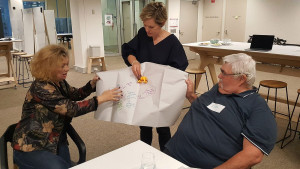
How did the School of System Change influence that journey? How did Basecamp impact how you work?
The School helped fill in the blanks on the ‘looking out’ stuff that I felt was missing in my design practice. It helped me push my boundaries, explore my learning edge, and appreciate different approaches outside of my comfort zone. And hearing what my peers were doing in social impact and sustainability was very inspiring. All of this led me to move to Europe to pursue work in this area, as I sensed an energy here and bigger opportunities that I wanted to be part of.
All of the sessions and mentors were excellent, but I found two particularly influential: Ben Haggard from Regenesis on ‘the narratives of trees’ and the need for constant regeneration of fields, and Bill Sharpe from International Futures Forum introducing the Three Horizons Framework, taking a “holism with focus” focus to exploring futures in practice with diverse actors; I’ve since explored this technique with STREAT in Melbourne, and hope to do more with it.
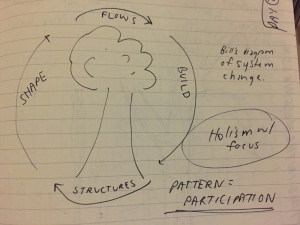
Beyond the coursework, one of the biggest impacts have been the fantastic people I met through Basecamp; I’m certain some of these friendships will be lifelong. Every person brought something unique to the group, and deep experience in sustainability and social impact in different cultural contexts. It was also great to involve some alumni in the pilot feedback round of Empathy Talks, a project I helped design in early 2021.
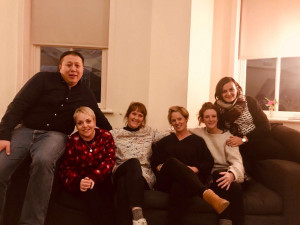
What are your key learnings from systems thinking / what would be your 3 keys to change?
- “No solo climbing” in the words of Maureen O’Hara; working in uncertainty and complexity is difficult. Reach out to others for support and guidance. Form peer support networks and learn from each other.
- It’s ok to feel like a lone weirdo*, and many working in the systems change space indeed feel this way as they explore their learning edge. To cope with this, see point 1.
(*as described by Saltmarshe, Robinson & O’Hara, 2020) - The word ‘systems’ is technocratic and puts people off. We have to meet people where they are. As Ray Ison puts it, we need to smuggle in systems thinking. Then once people have been through a process and something has shifted, announce the smuggle and what was smuggled i.e. the systems approach. Recommended: interview with Ray Ison and Ed Straw on this topic.
What’s next for you? Where do you hope your journey will take you?
I plan to keep experimenting and pushing my learning edge here as I get deeper into system change work for climate action. That includes being more active within local community-led initiatives such as Donut Berlin. Moving to Europe at exactly the moment the pandemic struck has been like jumping in the deepest of deep ends, but it’s also felt like fortuitous timing in some ways; the appetite for change here feels palpable and opportunities more within reach; I hope we can genuinely harness this moment and that I can play a role in helping, even in the smallest of ways.
Read more about Kate’s work here:
- Interview on Doughnut Economics and moving from UX to systems-led design (June 2021), based on this article about ‘Designing the Doughnut’ (April 2021)
- Empathy Talks, a conversational toolkit for fostering empathy; design team member (January 2021)
- This is HCD Ireland presentation on Design for Sustainability (March 2021)
- This is HCD Berlin presentation on systems thinking + HCD in criminal justice (August 2020)
- Using Three Horizons Framework in a food systems context with an Australian social enterprise (June 2020)
- More at matchboxstudio.com.au



